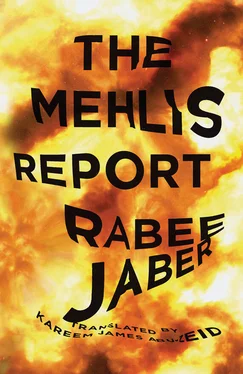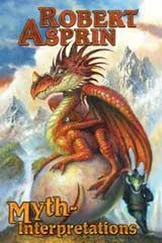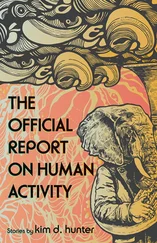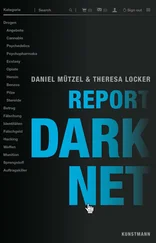Saman Yarid passes behind the renovated buildings. He needs to go home to shower and change before heading to Cecilia’s. The old women holding up photos in front of the statue of Gibran remind him of a house in the neighborhood, a house near the Afran al-Hayek Bakery. The house was boarded up in 1976: its family abandoned it during the Two-Year War and went abroad. No one’s entered it since. There are iron chains around the door. The windows are shuttered. Thistles have covered the entrance and crept up the stairs. Weeds have overrun the house’s garden. Countless birds fly up from the dry black trees: they hover around the new Hermitage Building and the stunted cypress trees planted on its roof. The birds trace dark circles in the air, then return to the abandoned garden.
I can see you from here, Saman. I can see you beneath the Roman goblets carved into the stone wall above the fountains. You can’t see me as you wash your face and feel a bit of pain in your muscles, but I see you. I see you standing in front of the old house with the arches and green shutters, looking at it, then turning around to look at the many stories of the Al-Murr Tower. The house is abandoned, and so is the tower. The city’s been filled with shuttered houses for thirty years, uninhabited buildings that no one sees, hidden behind people’s homes, hidden away on side roads — but even the locked-up houses you can see on the main roads seem invisible. The eye has grown used to seeing those trees, those closed shutters. The eye glides over the rooftops without a thought. Empty houses, at once visible and invisible. And up in the trees, sparrows build their nests.
On the road from the Al-Murr Tower to the Banque du Liban (in the Hamra district), the many abandoned buildings hide behind high walls. These walls keep the eyes away, but time has pierced their iron gates. If you look through the many holes, you can see crumbling mansions, and stairs rising into darkness, and thistles sprouting through the stairs and climbing the desiccated trees. Why are these buildings still closed? Here and there, scattered construction sites can be seen: noise and dust and activity.
Do you remember Salim Surour’s house, behind the Government Palace? A three-story brick building, do you remember? It was destroyed in the war, and not a single brick remained. But a picture of it was preserved on a postcard. And now they’re building it again, from that picture. She can almost see the postcard on the architects’ table, right beside the plans. They’re building it just like it used to be before the war. If it weren’t for that picture, for that postcard, would anyone remember it? Would they be rebuilding it? Tomorrow, when the house is finished, its new occupants will sit on the third-floor balcony and look at the windows and bricks of the Government Palace. And if they turn their eyes a bit, they’ll see a modern building with green windows: that one houses the Japanese Embassy.
I see you all by yourself, Saman. You want to know what binds you to this city, but you don’t know. It’s like your guts are tied to Beirut’s, and you don’t know why. You go your way while your eyes drink in the buildings and the streets, the city’s hidden nooks. Wrought iron doors. Polished walls. How many cities are hidden in the belly of this one city? At rare times, you see all of those cities together. At night, when you push the window open, outward, and hear the wooden shutters bang against the wall and then retreat into the darkness, your heart jumps. It doesn’t jump because of the sound of wood striking wood: you’re not scared of that noise. You’re not scared it will wake up the naked woman under the sheets. Like you, she drank a lot before going to sleep. You can tell she’s sound asleep from her breathing. Even if they started shelling the city right now, she still wouldn’t open her eyes. “And if it weren’t for my headache, I wouldn’t have woken up.”
Your heart jumps when you push the shutters outward, revealing the lights of the city. The sea appears — a portion of the sea — in the glow of the streetlamps. The sea looks like a black mirror reflecting the lights beneath the black mountain. You look at the mountain, you look at the locked-up dump site, and you remember what you read in the paper about the giant rat living in the landfill’s belly.
If a person dies before their time has come, some life is still left within them. What do they do with the rest of their life when they’re dead? The life that’s left over won’t let them rest.
This room is as long as a tunnel. I’m sitting at the end of it and writing to you. There are books on the shelves around me — this place is full of books. It’s a library. There are white stone walls and red wooden bookshelves. An old man comes over from time to time and places a cup of water in front of me. He doesn’t distract me from my work. He doesn’t say a word. Sometimes he comes over and sets down the cup without my realizing it: I’m so immersed in writing that I often don’t notice the outside world. You go to a far-off place when you write, a place only you have access to; and if what you’ve written is good, a day comes when others enter that place as well. But you don’t think of them while you’re writing. You think of words. Your head surges, then abates. One moment the images and memories flow one after the other, and the next moment they’re gone. Darkness, then light. And you’ve got to be ready. You’ve got to work harder. This pain in your eyes, this headache that envelops the brain: it’s all a small price to pay. We don’t do anything else here. Reading. And writing. Reading is more important than writing. All of us here read. And for all of us a day comes when we write. On a single page, you write the story of your life from beginning to end.
I came here when I was young. I used to think I was a “young woman.” How could I not be a young woman if I was studying engineering in college and had a boyfriend who loved me and who’d fight to keep me in his bed night after night after night. He used to take me out to eat, to the movies, to the sea, to the ski resorts of Faraya; and he used to take me to his apartment. He’d cook me delicious meals and shower me with gifts. I haven’t forgotten the things he used to do for me, the things he used to do with me. How could I forget? When I close my eyes now, I can still see his fingers, his shoulders, his back, even his feet. How could I forget?
The blows on my head. Why were they beating me? I was afraid of tearing my dress, afraid they’d rip the clothes I loved, afraid of their eyes and teeth and hands. I couldn’t believe it when they slammed my head against the wall. I remember the searing pain in my nose, the pain between my eyes. It’s a distant memory, but it’s still there, it hasn’t disappeared. My limbs gave out under me like water, and I collapsed. I thought I’d be left alone now. Or maybe that they’d rip off my clothes and have their way with me. But none of them ripped off my clothes. The green blouse. The gray wool skirt with blue polka dots. A gift. I didn’t buy that skirt. The blouse wasn’t a gift. I bought it myself, in Brussels. I remember the rain that day. And I remember — while our bags were full — how we stood in front of the restaurants on the wide cobblestone plaza, the rain streaming from the sloping rooftops and forming ever-larger puddles. The restaurants opened onto the alleyways in front of them, and men were cooking in giant pots. A festival of food and drink. A man was pouring a bottle of wine into a wide pot, and with his other hand he held a wooden spoon and stirred some mashed potatoes with milk and mushrooms. Behind him another man was slicing off strips from some pork that was slowly being grilled. A crowd of breath and steam and music. The green blouse was in the red bag with the store logo on it. We laughed as we drank red wine and ate slices of roasted meat from a carton with a cellophane cover. We ate with white plastic forks and knives. The meat came first. Then the deep dishes of potatoes puréed in wine. We ate standing. The tall circular tables looked like wine barrels. The music blended in with the murmur of the rain, with the laughter, with the flushed and happy faces, with the water dripping from the rooftops. What was I wearing? Velvet pants stained with rainwater. I remember how the spots of rain spread on those pants. I remember the warmth of the food. I remember how tired my legs were from walking through all the shops. We’d been walking since morning. I remember the wine: the taste is still in my mouth. I feel the need to cry as I write these words. But I don’t cry. I look at my wool skirt, the gray skirt with blue polka dots, I look at it and I don’t cry. I came here wearing it. And I’m still wearing it. All of these years and it hasn’t worn out. Clothes don’t wear out here.
Читать дальше












